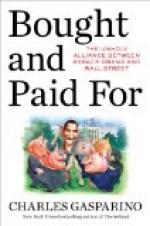She stopped short. Her eyes had just lighted on the lunch box on the table. Swooping down on it like an angry vulture she exclaimed angrily: “What’s that?”
Even in his bluest moments, Jimmie never lost his sense of humor. Picking up the box and pretending to examine it, he said:
“I think it’s a bunch of lilies of the valley.”
He grinned, but got no response. Fanny was not in a mood to jest.
“Oh, don’t get funny,” she said crossly. “I know it’s your lunch box all right, but what’s it doing on the table? Put it in the drawer where it belongs.” He hesitated, still grinning, and she went on sternly: “Go on, now! I’ve got enough to do without putting things away after you.”
Rising, he took the offending box and placed it in a drawer of the sideboard. When this was done Fanny pointed to his hat and coat:
“Now hang them up in the hall,” she ordered.
Without another word he picked up the things and left the room. Directly he was gone, Fanny took a key from under a vase, opened another drawer in the sideboard and put the money in it. Then she hastily locked the drawer and replaced the key. No sooner was this done than Jimmie reappeared. He was puffing a cheap cigar and judging by his expression the flavor was not all that it might be. After a few moments, and while Fanny was laying the cloth, he threw it away with an exclamation of disgust:
“It’s no good! I can’t get used to these damned cheap things. I suppose I’d be satisfied with ’em if I’d never smoked real cigars! But to be educated up to Villa de Villas and then drop to them—punkerinos—”
Fanny looked round, saw the cigar on the floor and then looked at him:
“Jimmie,” she said, “pick that up and let it die outside.”
He obeyed her without a word. Opening the window he picked up the offending weed and threw it out.
“Ha! ha!” he laughed bitterly. “In three months to parachute from first-class cafes to carrying home-made lunches; to go from threes for a half to twos for a nickel; instead of having plenty of money in pocket to be without even a cent! I tell you, Fanny, the way we’re living now is—hell!”
Flopping down on a chair near the table, he presented an abject picture of utter despondency. If Fanny had been in better humor she would have laughed at him, but in her present mood his complaints only irritated her the more. Stopping in her work, she turned on him. Her face was flushed; her eyes flashed fire. At last the moment had come to give it to him:
“Don’t you think I know it better than you do?” she cried. “I used to be able to pay twenty-five or thirty dollars for a hat, now when I want one I’ll have to trim it myself; I could have a taxi once in a while, now I’m lucky if I can take a car; a seat in the orchestra at the matinees was none too good for me, now I think it is great to go to the moving pictures; I used to




